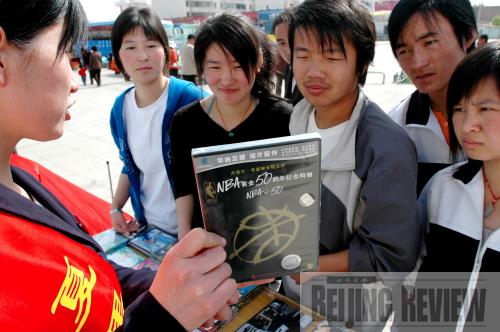|
 |
|
REAL OR FAKE? As part of the nationwide Intellectual Property Protection Week, Yinchuan City officials set up street stands to educate people on how to detect pirated videos and music (WANG PENG) |
China's intellectual property rights (IPR) protection authorities signaled they were prepared to shoulder heavier responsibilities in fighting piracy as they processed 828,000 patent applications and granted 412,000 new patents in 2008, said a state official on April 21, 2009. Both numbers represented nearly 20-percent growth are meant to show the country is taking intellectual property violations seriously.
During a press conference, Tian Lipu, Director of the State Intellectual Property Office (SIPO), said China has in total processed over 5 million patent applications and registered 3.44 million trademarks, of which 600,000 belonged to foreign enterprises.
Foreign businesses applied for more than 17,000 trademarks in China last year alone through the Madrid System for the International Registration of Marks, a major international system for facilitating the registration of trademarks in multiple jurisdictions. The number of registrations was enough to rank China first in the world for the fourth consecutive year, said the State Administration for Industry and Commerce.
The year 2008 marked the Chinese Government's upgrading of IPR protection to a national strategy, indicating its determination to enforce IPR protection," Tian said.
On April 9, 2008, the State Council adopted the Outline of the National Intellectual Property Rights Strategy, aimed at promoting innovation and the use of new technologies by China's industries.
"This outline is more than IPR protection. More importantly, it emphasizes IPR creation, which is to encourage innovation, invention and creativity throughout the world," said Tian.
Answering a question on the significance of China's IPR strategy in the context of the global economic downturn, Tian said Chinese enterprises that are able to weather the gloomy market and maintain vibrant growth are those with their own brands, core technologies and high-value-added products.
"The Central Government has realized China must attach great importance to IPR and formulate its strategy if the country wants to maintain its sustainable, stable and long-term economic growth," said Tian.
At the same press conference, Wang Ziqiang, Spokesman for the National Copyright Administration, said China would draw on its successes when fighting against Olympics-related piracy last year to crack down on online IPR violations. The administration, Wang said, will adopt hi-tech tools and increase its communication with IPR owners.
On April 20, 2009, Francis Gurry, Director General of the World Intellectual Property Organization (WIPO), said in a video played at China's Intellectual Property Protection Week that China's development in the intellectual property sector was faster than that of many other countries, which contributed to the world's needs to continually innovate, according to a Xinhua report.
This was China's seventh annual Intellectual Property Protection Week, which ended on April 26's World Intellectual Property Day. This year's protection week featured lectures on intellectual property protection, cracking down on illegal video and audio products and a white paper on intellectual property protection enforcement by China's customs administrations.
| 